-
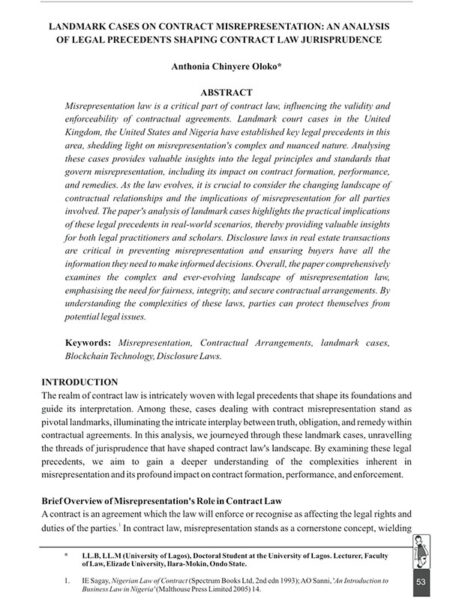
Landmark Cases on Contract Misrepresentation: An Analysis of Legal Precedents Shaping Contract Law Jurisprudence
0₦2,500.00Anthonia Chinyere Oloko, in her article, Landmark Cases on Contract Misrepresentation: An Analysis of Legal Precedents Shaping Contract Law Jurisprudence, visits the law on misrepresentation as a critical part of contract law, influencing the validity and enforceability of contractual agreements. Landmark court cases in the United Kingdom, the United States and Nigeria have established key legal precedents in this area, shedding light on the complex and nuanced nature of misrepresentation. Analysing these cases provides valuable insights into the legal principles and standards that govern misrepresentation, including its impact on contract formation, performance, and remedies. As the law evolves, it is important to consider the changing landscape of contractual relationships and the implications of misrepresentation for all parties involved. The paper’s analysis of landmark cases highlights the practical implications of these legal precedents in real-world scenarios, thereby providing valuable insights for both legal practitioners and scholars. Disclosure laws in the realm of real estate transactions are critical in preventing misrepresentation and ensuring that buyers have all the information they need to make informed decisions. Oloko provides a comprehensive examination of the complex and ever-evolving landscape of misrepresentation law, emphasising the need for fairness, integrity, and secure contractual arrangements. By understanding the complexities of these laws, parties can protect themselves from potential legal issues.
-
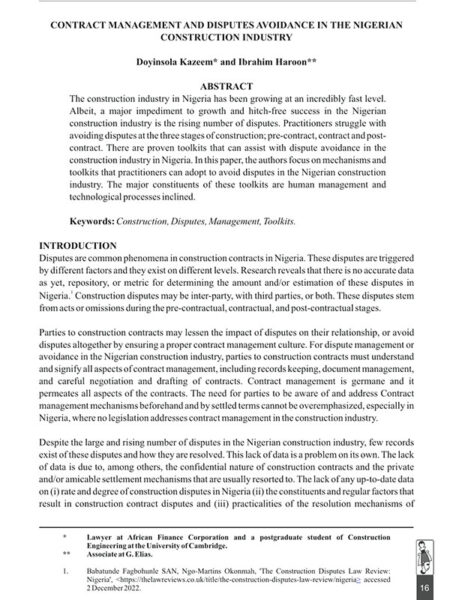
Contract Management and Disputes Avoidance in the Nigerian Construction Industry
0₦2,500.00Doyinsola Kazeem of the African Finance Corporation and a postgraduate student of Construction Engineering at the University of Cambridge, and Ibrahim Haroon, Associate at G. Elias, in their article, Contract Management and Disputes Avoidance in the Nigerian Construction Industry, observe that the construction industry in Nigeria has been growing at a breakneck pace. A significant impediment to growth in the industry is the rising number of disputes. Practitioners struggle with avoiding disputes at the three stages of construction: pre-contract, contract and post-contract. There are proven toolkits that can assist with dispute avoidance in the construction industry in Nigeria. Kazeem and Haroon focus on mechanisms and toolkits that practitioners can adopt to avoid disputes in the Nigerian construction industry.
-
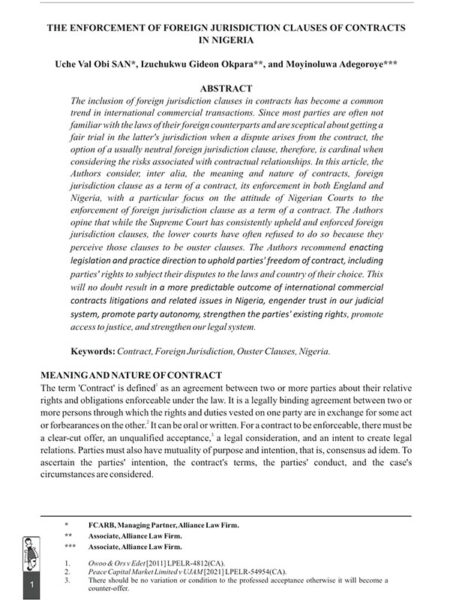
The Enforcement of Foreign Jurisdiction Clauses of Contracts in Nigeria
0₦2,500.00Uche Val Obi SAN, Izuchukwu Okpara and Moyinoluwa Adegoroye, all of the Alliance Law Firm, in their article, The Enforcement of Foreign Jurisdiction Clauses of Contracts in Nigeria, note that the inclusion of foreign jurisdiction clauses in contracts has become a common trend in international commercial transactions. Since most parties are often not familiar with the laws of their foreign counterparts and are sceptical about getting a fair trial in the latter’s jurisdiction when a dispute arises, the option of a usually neutral foreign jurisdiction clause, therefore, is cardinal when considering the risks associated with contractual relationships. Uche Obi SAN et al consider the meaning and nature of contracts, foreign jurisdiction clause as a term of a contract, and its enforcement in England and Nigeria, with particular focus on the attitude of Nigerian Courts to the enforcement of foreign jurisdiction clause as a term of a contract. They opine that while the Supreme Court has consistently upheld and enforced foreign jurisdiction clauses, the lower courts have often refused to do so because they perceive those clauses to be ouster clauses.
-
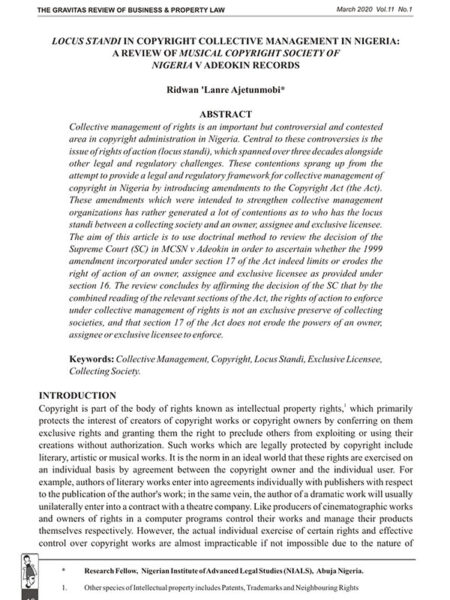
Locus Standi in Copyright Collective Management in Nigeria: A Review of Musical Copyright Society of Nigeria v Adeokin Records
0₦2,500.00Ridwan Ajetunmobi, Research Fellow at the Nigerian Institute of Advanced Legal Studies Abuja Nigeria, in Locus Standi in Copyright Collective Management in Nigeria: A Review of Musical Copyright Society of Nigeria v Adeokin Records, examines the Supreme Court decision in Adeokin against the background of the amendments to the Copyright Act in 1992 and 1999 with regard to whether the right of action in copyright infringement is exclusive to collecting societies or is available to an owner, assignee or licensee of copyrighted works.
-
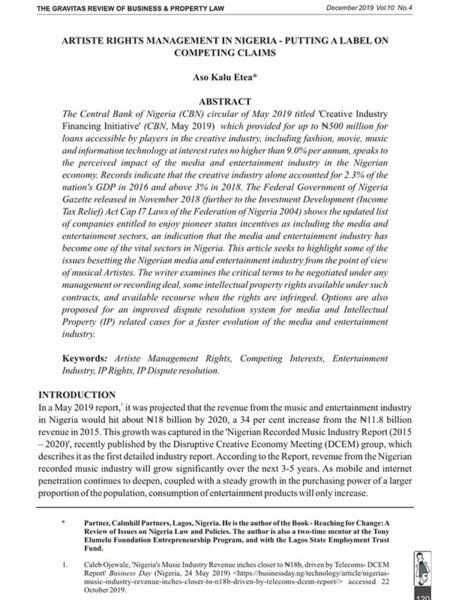
Artiste Rights Management in Nigeria – Putting A Label on Competing Claims
0₦2,500.00Aso Etea, Partner, Calmhill Partners, Lagos Nigeria in his article, Artiste Rights Management in Nigeria – Putting A Label on Competing Claims, reflects on the state of, and issues besetting, the creative industry in Nigeria. He graphically depicts ‘the making and breaking of careers’ of some artistes and what they ought to have done better. Aso examines the critical terms to be negotiated under any management or recording deal, intellectual property rights available under such contracts, and available recourse when the rights are infringed. He proposes an improved dispute resolution system for media and Intellectual Property (IP) related cases for faster evolution of the industry.
-
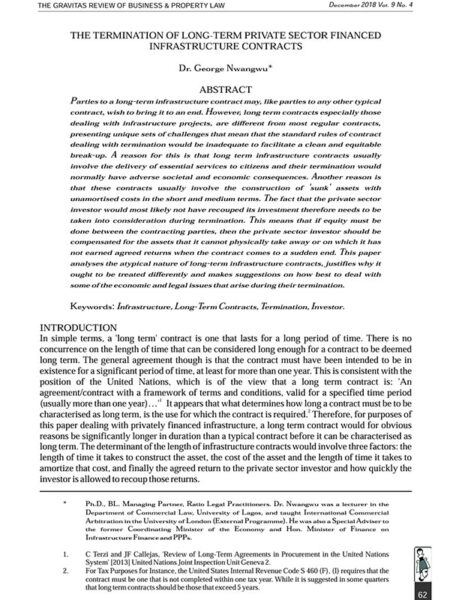
The Termination of Long-Term Private Sector Financed Infrastructure Contracts
0₦2,500.00Dr George Nwangwu, Managing Partner, Ratio Legal Practitioners, and Special Adviser to the former Minister of Finance on Infrastructure Finance and PPPs in his article, The Termination of Long-Term Private Sector Financed Infrastructure Contracts, observes that long-term contracts especially those dealing with infrastructure projects, are different from most regular contracts, presenting unique sets of challenges that mean that the standard rules of contract dealing with termination would be inadequate to facilitate a clean and equitable break-up. Dr Nwangwu analyses the atypical nature of long-term infrastructure contracts, justifies why it ought to be treated differently and makes suggestions on how best to deal with some of the economic and legal issues that arise during their termination.
-
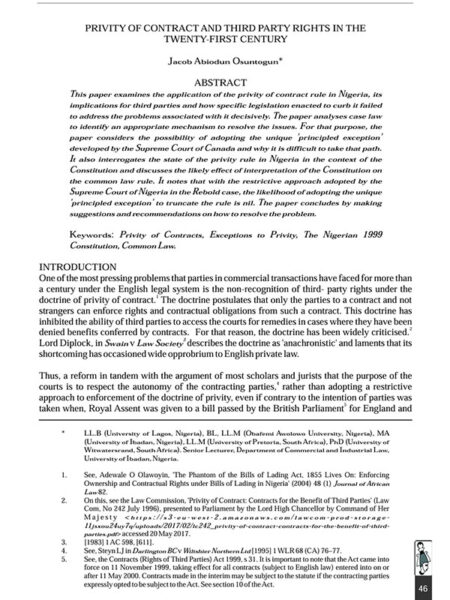
Privity of Contract and Third Party Rights in the Twenty-First Century
0₦2,500.00Dr Jacob Osuntogun of the University of Ibadan in, Privity of Contract and Third-Party Rights in the Twenty-First Century, examines the application of the doctrine of Privity of Contract in Nigeria, and its implications for third parties. He analyses Nigerian cases on the doctrine including the Supreme Court decision in Rebold v Magreola; various exceptions to the Privity rule and how specific legislation enacted to address the inadequacy of the rule have fared. He interrogates the possibility of adopting the unique ‘principled exception’ rule developed by the Supreme Court of Canada and advocates the enactment of comprehensive legislation to address the shortcomings of the doctrine.
-
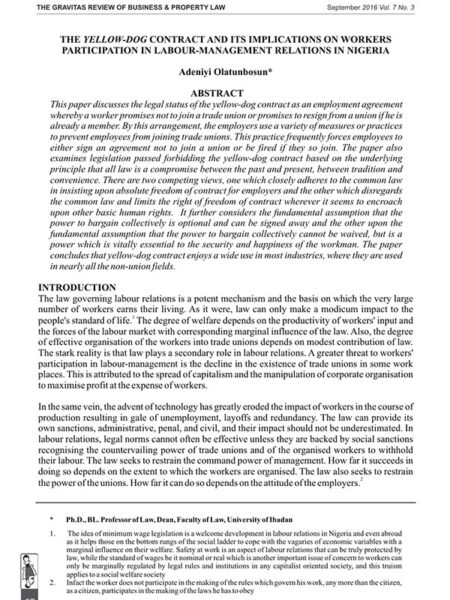
The Yellow-Dog Contract and its Implications on Workers Participation in Labour-Management Relations in Nigeria
0₦2,500.00Professor Adeniyi Olatunbosun, Dean, Faculty of Law, University of Ibadan in “The Yellow-Dog Contract and Its Implications on Workers Participation in Labour-Management Relations in Nigeria” discusses the legal status of the yellow-dog contract as an employment agreement whereby a worker promises not to join a trade union or promises to resign from a union. He examines statutory provisions prohibiting workers from joining a trade union and those forbidding the yellow-dog contract. He explores two competing views, one which adheres to the common law in insisting upon absolute freedom of contract for employers and the other which limits the right of freedom of contract wherever it seems to encroach upon other basic human rights. He concludes that the yellow-dog contract enjoys a wide use in most industries, where they are used in nearly all the non-union fields.
The Gravitas Review of Business & Property Law



